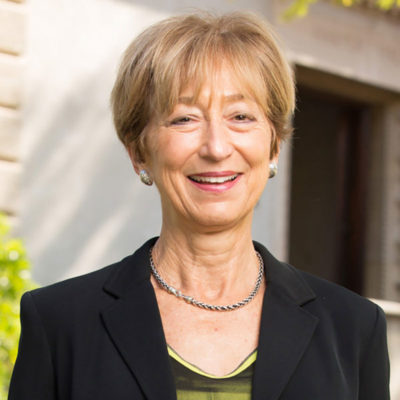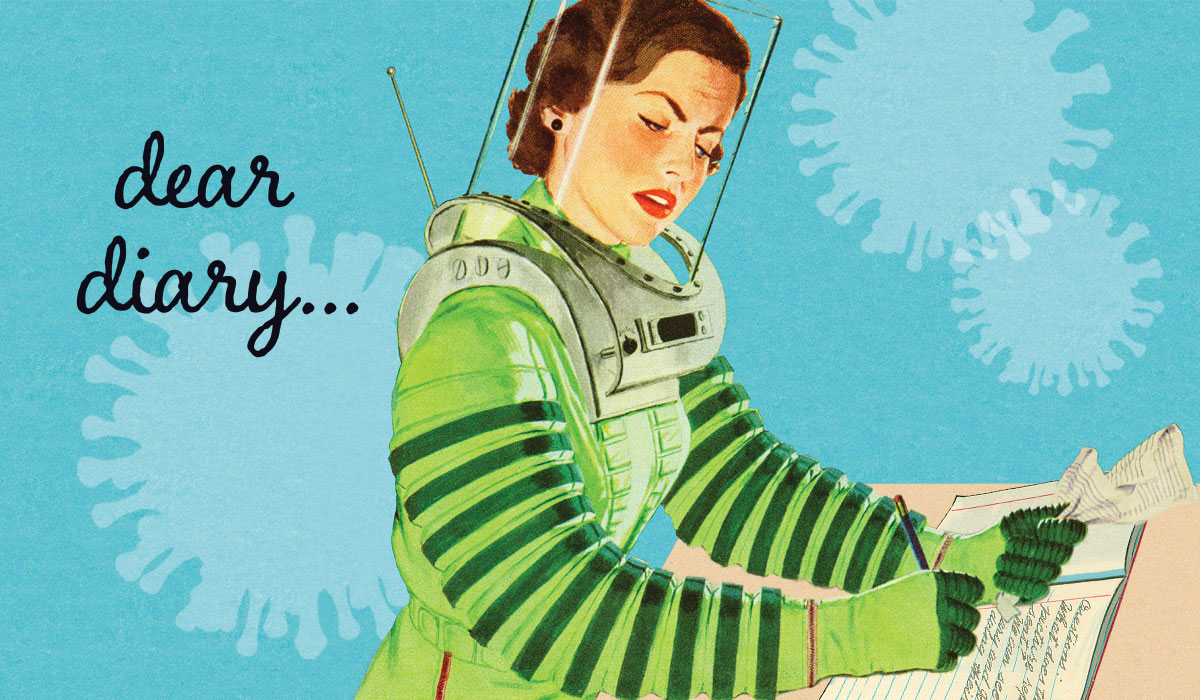Dear Pandemic
For four decades, since 1981, Kathy Pezdek has been a professor of psychology at CGU—but in her own more precise definition of the kind of research she does (that indeed consumes her), she describes herself as a cognitive scientist, plain and simple.
“When I work, it is butt-in-the-chair-for-12-hours-a-day kind of work,” she says. “As a cognitive scientist, my particular area of research is generally on the topic of memory. A fair amount of my work has been on autobiographical memory for the events of your life—what you remember about your past, basically. I’ve studied lots of different aspects of that.”

With the COVID-19 Journal Project, Pezdek’s latest research study conducted with Tyler Shapland (a fourth-year graduate student in her department), they asked a small group of volunteers—starting in March 2020—to keep a daily journal about their thoughts and feelings during the pandemic.
She stresses that, unlike her earlier study devoted to the traumatic events of 9/11 (which looked at the memories of New Yorkers living through the attacks), the COVID project isn’t a memory study.
“I wanted this to be a memory study, but I didn’t know in the beginning what I would be asking the participants that might pertain to memory,” she explains. “But it did end up going right back to 20 years ago and that 9/11 study—to wit, when a salient, traumatic event happens to people, what are their cognitions of that event? That’s what I was looking for.”
Quarantine as a Social Experiment
“I’m kind of a nut,” Pezdek continues. “Whenever I do research, I’m always thinking about how it’s reflected in my life and what’s happening in my life that’s related to the research I’m compiling.”
Pezdek found herself taking a much longer view regarding the pandemic and quarantine than her students.
“When it started, I had graduate students who were saying: ‘Well, how are you going to teach your classes for the next MONTH!’ I said to them: ‘No! This is at least a year in duration; we’re going to be in isolation for at least a year. We need to frame it that way and set up our lives that way. That’s the new reality.’ At first, people were saying I was overreacting.”
I wanted this to be a memory study, but I didn’t know in the beginning what I would be asking the participants that might pertain to memory,” she explains. “But it did end up going right back to 20 years ago and that 9/11 study—to wit, when a salient, traumatic event happens to people, what are their cognitions of that event?” — Kathy Pezdek
If the pandemic indeed turned out to be a lock-down social isolation experiment, Pezdek thought, how would people respond? She wanted to know how they coped and what they thought. So, she queried more than 100 potential journal participants (a “snowball sample,” she calls it) to keep a journal which, in her view, was a “big ask.”
The journal was supposed to cover everything and anything; she didn’t want her subjects to focus specifically on the pandemic.
“I didn’t want their current thoughts and feelings about it, just whatever their thoughts and feelings happened to be,” Pezdek says. “And that’s important because if people were thinking about how important it was to keep their house really clean, which has nothing to do with the pandemic, that’s what I wanted to know.”
Small But Meaningful
It turned out that four willing participants in Pezdek’s project, all ranging in age from 64-70, saw it through to the end. In May, she collected their journals and was surprised at the sheer volume of responses. Some of them pointed to several confounding circumstances in a very turbulent year for multiple reasons.
This resulted in what Pezdek calls “a confound”—when two or more things happen simultaneously, and any of them could be the cause of the effect that is being examined.
“For example,” she explains, “one participant’s journal entry said: ‘I really do so much better if I don’t look at the news. It just seems that the world outside my home is going up in flames.’ I don’t know whether that worried response stems from the virus, the insurrection at the Capitol, or racial anxiety, or what. That’s a confound.”
A key takeaway from the COVID-19 Journal Project is the number of positive emotions participants actually expressed.
“I think that’s really important,” she says. “This was a particularly hardy group of people that were trying to do all kinds of things to make it be better, to keep going, to exercise. I know from many college students who I spend lots of time with that there were a lot of people that were overwhelmed by their negative emotions and did not cope very well. They sank into depression and didn’t get much done.”
For Pezdek, being isolated at home in front of a computer should have offered a silver lining to them.
“I kept saying you’ll never have a better opportunity to get work done. You don’t ever have to leave your computer,” she says.
Coping as We Get Older
According to Pezdek, the project also suggested that older people have a more realistic context for everything that happens in their life. In many cases, they’ve learned and developed better coping strategies. That said, when her project participants finally received their vaccinations, it was like they were “born again.”
“They got their lives back. They were very aware of it and perceived it that way,” she says.
Pezdek is reticent to make any policy suggestions based on her pandemic research (“That’s outside of my field,” she says.) Instead, she would remind people that when they’re coping with an unknown situation—the duration of which is unknown to them—they should anticipate that it could lead to a long-term change in their lives and well-being.
“Don’t just collapse in lethargy, withdraw, and get depressed,” she says. Instead, it’s more important to adapt daily strategies to cope with it.
Oscar Wilde once said that memory is the diary we all carry with us. Pezdek has made it her life’s work to compile the research that backs that remark up.
ARE WE GOING TO FORGET QUARANTINE ONE DAY?
Vice published the article “You’ll Probably Forget What It Was Like to Live Through a Pandemic,” which cites the research of Professor Kathy Pezdek, who looked at the memories of New Yorkers living through 9/11.
New York Magazine also cited Pezdek’s past research during its The Cut podcast episode “The Truth About False Memories.” Read a transcript of the podcast.
Johnson is a regular Flame contributor whose work has appeared in numerous publications, including People magazine and TVLand.com.
